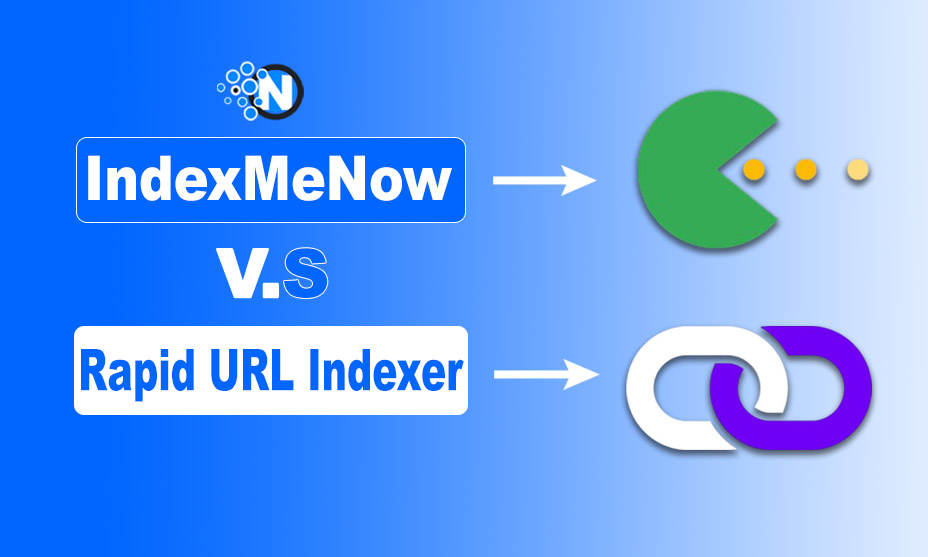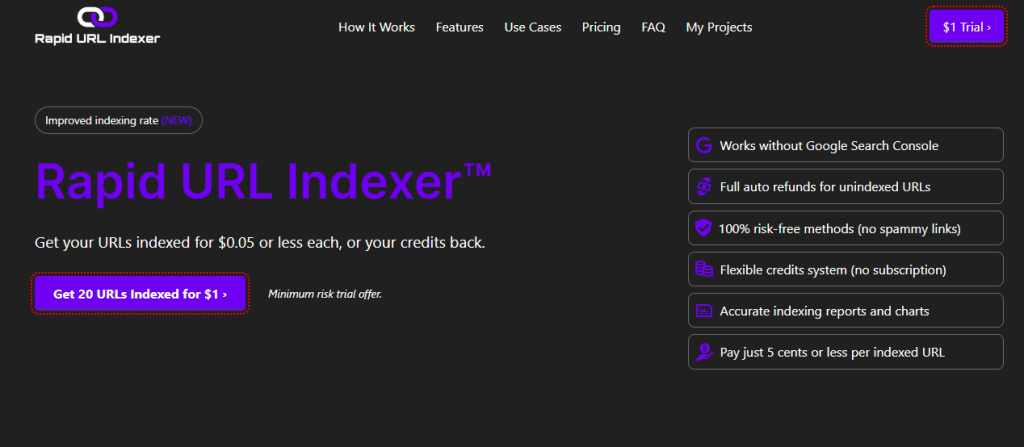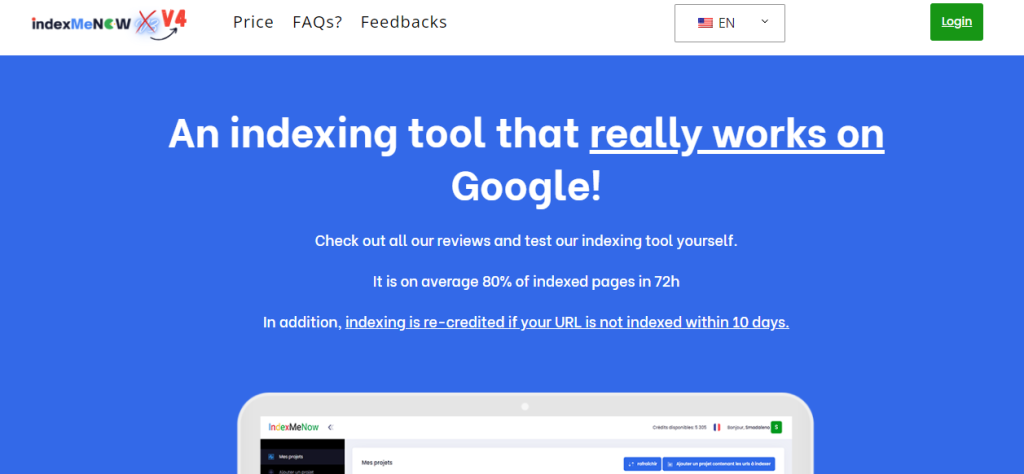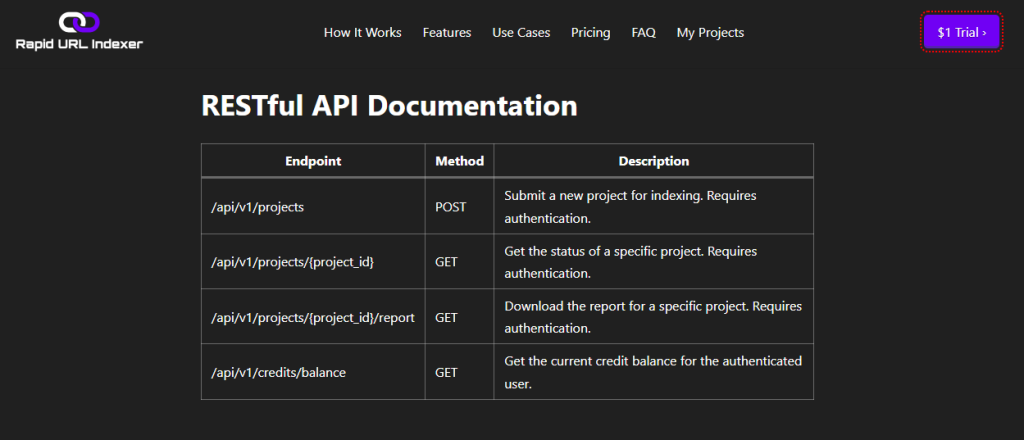
Online visibility depends on getting Google to index your website as quickly and effectively as possible. This is where using the right indexing tool comes in handy. In this competitive digital world, two well-known tools are TitleIndexMeNow and Rapid URL Indexer.
Google indexing services are essential tools for SEO professionals and website owners. This article compares two popular options: IndexMeNow and Rapid URL Indexer. We will examine their features, pricing, indexing methods, and more to help you make an informed decision about which service best suits your needs.
Overview of Both Google Indexing Services
Below we have explained IndexMeNow and Rapid URL Indexer in a detailed manner for your convenience:
What is Rapid URL Indexer?
Rapid URL Indexer is a powerful indexing service known for its high success rate and comprehensive features. It is designed with SEO professionals in mind, offering a user-friendly interface and advanced tools. Rapid URL Indexer boasts an average indexing rate of 91%, uses a pay-as-you-go pricing model, and provides a 100% credit auto-refund for unindexed URLs within 14 days.
The service includes several additional tools, such as a WordPress plugin, RESTful API, detailed visual charts, CSV report downloads, unbranded reports, and an affiliate program. These features make Rapid URL Indexer a versatile choice for various indexing needs.

What is IndexMeNow?
IndexMeNow is another popular indexing service that offers tools for quickly getting URLs indexed by Google. It uses a credit-based system and provides various plugins to streamline the indexing process. IndexMeNow has an average indexing rate of 80% and offers refunds for unindexed URLs after 10 days.
The service includes additional tools like a WordPress plugin, Chrome plugin, basic API, project-level statistics, and exportable results. While not as comprehensive as Rapid URL Indexer, IndexMeNow provides a solid set of features for basic indexing needs.

Indexing Methods and Reliability
How do the indexing techniques differ?
Rapid URL Indexer employs multiple safe and effective methods that work harmoniously with Google’s algorithms. This approach contributes to its higher success rate of 91%. The service uses a combination of techniques that adapt to Google’s ever-changing algorithms, ensuring consistent performance.
IndexMeNow, on the other hand, relies on a combination of three specific indexing techniques. While effective, this more limited approach results in a lower average success rate of 80%.
What are the success rates for each service?
Rapid URL Indexer’s 91% average indexing rate provides more reliable results and improved search visibility. This high success rate means that users can expect most of their submitted URLs to be indexed quickly and efficiently.
IndexMeNow’s 80% average indexing rate breaks down as follows:
- 60% of URLs indexed within 24 hours
- 10% indexed after 24 hours
- 10% indexed after 72 hours
- The remaining 5% indexed up to 10 days later
While still effective, IndexMeNow’s lower success rate and longer indexing times may impact the speed at which new content becomes visible in search results.
Pricing Models
How does Rapid URL Indexer’s pricing work?
Rapid URL Indexer offers a flexible pay-as-you-go model, ensuring users only pay for successful indexing attempts. This pricing structure provides excellent value, especially for those with varying indexing needs. The prices are as follows:
500 Credits cost $25, while 1,500 Credits are priced at $68, offering a 9% savings. For larger needs, 5,000 Credits are available for $213, providing a 15% savings. The highest tier, 50,000 Credits, costs $2,000 and offers a substantial 20% savings.
What is IndexMeNow’s pricing structure?
IndexMeNow uses a credit-based system with higher costs per credit compared to Rapid URL Indexer. Their packages include:
60 credits for $59, 260 credits for $199, 600 credits for $399, and 2,000 credits for $999. While these packages offer flexibility, they tend to be more expensive per credit than Rapid URL Indexer’s offerings.
Refund Policies
What is Rapid URL Indexer’s refund policy?
Rapid URL Indexer provides a 100% credit auto-refund policy for URLs not indexed within 14 days. This policy is automatic, ensuring users only pay for successful indexing without needing to manually claim refunds. It’s a user-friendly approach that builds trust and ensures value for money.
How does IndexMeNow handle refunds?
IndexMeNow offers refunds for unindexed URLs after 10 days, credited back to the user’s account balance. While the process is stated to be automated, it may require manual checking and claiming in some cases. This policy, while still beneficial, isn’t as straightforward as Rapid URL Indexer’s automatic refund system.
Types of URLs Indexed
What types of URLs can Rapid URL Indexer handle?
Rapid URL Indexer can index a wide range of URL types, making it versatile for various SEO needs. It can handle regular web pages, product pages, backlinks, press releases, social media profiles, mass page websites, SEO testing pages, and even disavowed links. This broad capability makes it suitable for complex SEO strategies and diverse content types.

What URL types does IndexMeNow support?
IndexMeNow handles pages and articles from owned and non-owned sites, backlinks, and profile pages. While it covers the basics, it doesn’t specifically mention capabilities for mass page websites or SEO testing pages. This may limit its usefulness for some advanced SEO strategies.

Reporting and Analytics
What reporting features does Rapid URL Indexer offer?
Rapid URL Indexer provides comprehensive reporting and analytics tools that give users deep insights into their indexing efforts. The service offers detailed reports with visual charts, making it easy to understand indexing progress at a glance. Users can download CSV files for further analysis, which is particularly useful for large-scale indexing projects.
The status updates provided by Rapid URL Indexer are timely and accurate, allowing users to track the indexing process in real-time. This feature is especially valuable for time-sensitive content or when monitoring the impact of SEO changes.
One standout feature is the unbranded reports, which are perfect for agencies or consultants presenting results to clients. These professional-looking reports can be customized to match a company’s branding, adding an extra layer of professionalism to client interactions.
How does IndexMeNow handle reporting?
IndexMeNow offers a more basic set of analytics tools compared to Rapid URL Indexer. While it provides essential information on whether URLs have been indexed, the depth of analysis is somewhat limited.
The service does offer project-level statistics, which can be useful for tracking overall performance. Hourly indexing checks are another helpful feature, allowing users to monitor progress throughout the day.
IndexMeNow also saves a Google HTML backup for indexed URLs and preserves meta tags. This can be useful for tracking changes over time or troubleshooting issues. The ability to export results is available, but the format and detail of these exports may not be as comprehensive as those offered by Rapid URL Indexer.
Additional Features
What extra features set Rapid URL Indexer apart?
Rapid URL Indexer goes beyond basic indexing services by offering a suite of additional features designed to enhance SEO efforts. One of the most notable is its robust WordPress plugin. This tool integrates seamlessly with WordPress sites, allowing for automatic submission of new content for indexing. It’s a time-saver for content-heavy websites that frequently publish new pages or posts.
The RESTful API provided by Rapid URL Indexer is another standout feature. This API allows for deep integration with other tools and services, enabling users to automate their indexing workflows. For tech-savvy users or those with custom SEO tools, this API can be a game-changer in terms of efficiency and scalability.
Zapier integration is another powerful feature offered by Rapid URL Indexer. This allows users to connect their indexing efforts with hundreds of other apps and services, creating powerful automation workflows. For example, you could automatically submit new blog posts for indexing as soon as they’re published, or trigger indexing requests based on social media mentions.
The detailed visual charts provided by Rapid URL Indexer deserve special mention. These charts offer a clear, graphical representation of indexing progress and success rates. They’re not just visually appealing; they provide actionable insights that can inform SEO strategies and help users optimize their indexing efforts.
What additional tools does IndexMeNow provide?
While not as extensive as Rapid URL Indexer, IndexMeNow does offer some useful additional features. Its WordPress plugin is designed for automatic submission of new content, which can be a helpful tool for WordPress users looking to streamline their indexing process.
The Chrome plugin offered by IndexMeNow is a unique feature that allows for quick URL submissions directly from the browser. This can be particularly useful for SEO professionals who frequently come across new URLs that need indexing while browsing the web.
However, IndexMeNow’s additional features are more limited compared to Rapid URL Indexer. It lacks the advanced API capabilities and integrations that make Rapid URL Indexer so versatile.
User-Friendliness
How user-friendly is Rapid URL Indexer?
Rapid URL Indexer is very satisfied with its user-friendly design. The service strikes a mix between robust capabilities and usability, catering to both SEO experts and non-technical customers.
Users are guided through the indexing process by clear directions on a neat and well-organized interface. Thoughtful design and thorough documentation make even difficult activities more manageable, such as analyzing intricate reports or setting up API connectors.
In particular, the reporting system is quite easy to use. Even individuals who may not be professionals in data analysis may easily evaluate data and monitor progress thanks to the clear visual charts and graphs.
The user-friendliness of Rapid URL Indexer is further enhanced by the smooth WordPress connection. With this integration, indexing is nearly straightforward for WordPress users and requires very little setup or maintenance.
All features have thorough documentation available, giving consumers the tools they need to maximise the service. Because it is written in an easily understood style, users of all ability levels can benefit from this material.
What is the user experience like with IndexMeNow?
IndexMeNow takes a simpler approach to user experience. Its straightforward project creation process and easy URL submission system make it accessible to users who might be intimidated by more complex tools.
The basic analytics provided by IndexMeNow are easy to understand, though they may lack the depth that more advanced users might desire. The Chrome plugin is a user-friendly feature, allowing for quick submissions without needing to navigate to a separate website or tool.
However, the simplicity of IndexMeNow might be a double-edged sword. While it makes the tool easy to use for basic tasks, it may leave more advanced users wanting more in terms of features and customization options.
API Capabilities
What can you do with Rapid URL Indexer’s API?
The RESTful API of Rapid URL Indexer is an extremely useful tool that provides endless opportunities for automation and integration. them no longer need to manually submit a huge number of URLs for indexing because this API allows them to submit URLs programmatically.
Users can also verify the indexing status of provided URLs through the API. Large-scale SEO campaigns, where it would be unfeasible and time-consuming to manually check every URL, will find this function especially helpful.
The capability of the API to retrieve comprehensive reports is one of its most potent advantages. This gives users a more thorough picture of their SEO efforts by enabling them to include Rapid URL Indexer’s extensive reporting into their own dashboards or analytics tools.
Entire indexing workflows can be automated with the help of the API. For instance, you could build a tool that instantly indexes backlinks that are found or put up a system that submits newly updated product pages for indexing as soon as they are submitted to an e-commerce website.
The API’s capabilities are further expanded by the Zapier integration, which makes it simple to connect with hundreds of different apps and services without the need for complex coding knowledge.
What API features does IndexMeNow offer?
IndexMeNow’s API, while functional, is more limited in scope compared to Rapid URL Indexer’s offering. It allows for basic operations such as adding URLs to projects and checking project status.
Users can retrieve basic analytics through the API, which can be useful for integrating IndexMeNow data into other reporting tools. However, the depth and detail of this data may not be as comprehensive as what’s available through Rapid URL Indexer’s API.
The simplicity of IndexMeNow’s API might be sufficient for users with basic needs, but it may fall short for those looking to create more complex automations or integrations.
What We Conclude
Both Rapid URL Indexer and IndexMeNow offer valuable services for SEO professionals and website owners looking to improve their Google indexing. However, Rapid URL Indexer stands out with its higher success rate, more comprehensive features, detailed reporting, and powerful API capabilities. While IndexMeNow might be suitable for those with simpler needs, Rapid URL Indexer provides a more robust and versatile solution for serious SEO efforts.




